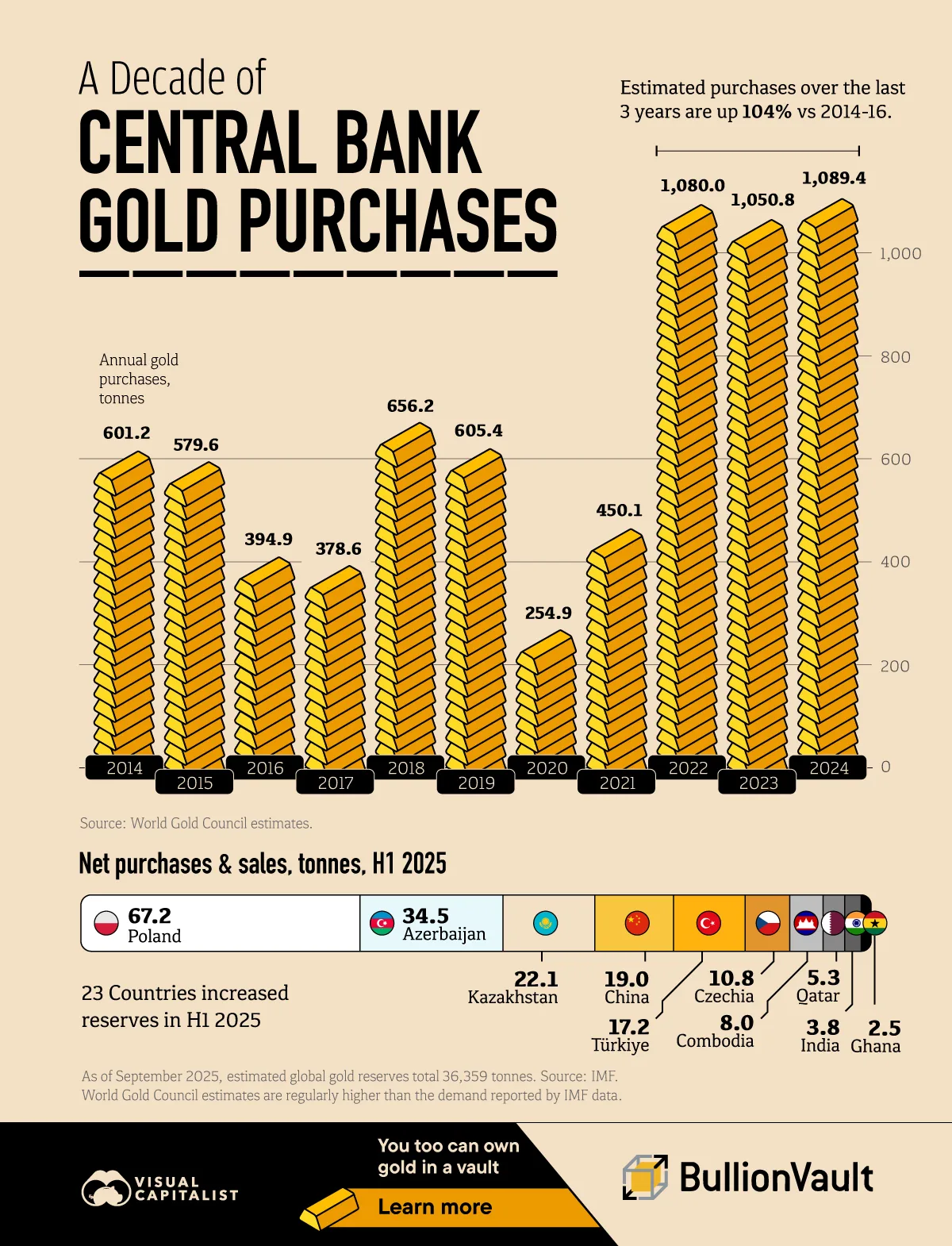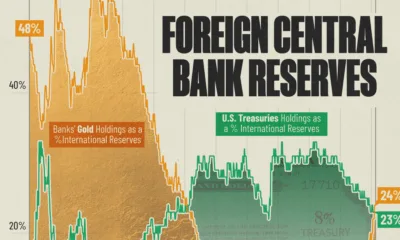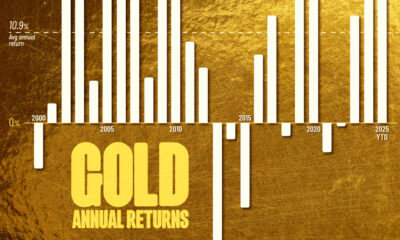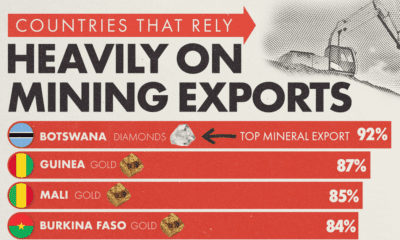
Published
1 hour ago
on
October 23, 2025
| 1,392 views
-->
By
Ryan Bellefontaine
Graphics & Design
- Athul Alexander
The following content is sponsored by BullionVault
A Decade of Central Bank Gold Purchases
Key Takeaways
- Central bank gold demand since 2022 exceeded 1,000 tonnes annually.
- Poland led H1 2025 buying; 23 countries added reserves.
- Three-year purchases are 104% above 2014–2016 totals.
As inflation and geopolitical troubles linger, how have central banks responded in terms of gold buying?
This graphic, in partnership with BullionVault, shows a decade of annual central bank gold purchases (2014–2024) and the top buyers in H1 2025 using data from the World Gold Council.
The Ten-Year Picture
Purchases accelerated after 2018, slowed in 2020, and then surged to more than 1,000 tonnes in 2022, 2023, and 2024. Consequently, the recent pace far exceeds the prior cycle.
Here is a table that shows annual central bank gold purchases (tonnes) from 2014–2024.
| Year | Annual central bank net gold purchases, tonnes |
|---|---|
| 2014 | 601.2 |
| 2015 | 579.6 |
| 2016 | 394.9 |
| 2017 | 378.6 |
| 2018 | 656.2 |
| 2019 | 605.4 |
| 2020 | 254.9 |
| 2021 | 450.1 |
| 2022 | 1080.0 |
| 2023 | 1050.8 |
| 2024 | 1089.4 |
From 2014 to 2016, central banks bought 1,575.7 tonnes. From 2022 to 2024, they purchased 3,220.2 tonnes, doubling purchases from nearly a decade earlier.
Who’s Buying in 2025
In H1 2025, Poland led with 67.2 tonnes, followed by Azerbaijan (34.5 tonnes) and Kazakhstan (22.1 tonnes). China added 19 tonnes, while Türkiye bought 17.2 tonnes.
Czechia, Cambodia, Qatar, India, and Ghana also increased reserves. Altogether, 23 countries grew holdings in the first half, underscoring broad participation.
What It Means for Investors
When official-sector demand rises, it often supports prices and sentiment. Gold is no different.
As of September 2025, estimated global official gold reserves total 36,359 tonnes, according to IMF data. However, World Gold Council estimates often exceed IMF-reported demand.
Estimated purchases over the last three years are up 104% versus 2014–2016. As central banks step up, investors of all stripes should take the cue.
Looking ahead, a world of uneven growth, sticky inflation, and recurring geopolitical flashpoints could keep market volatility elevated. Therefore, with central bank gold demand still strong, bullion offers a credible hedge and liquid diversifier for portfolios seeking resilience.

Buy Gold Online
Related Topics: #investing #gold #central banks #Poland #Bullionvault #World Gold Council
Click for Comments
var disqus_shortname = "visualcapitalist.disqus.com";
var disqus_title = "Charted: A Decade of Central Bank Gold Purchases";
var disqus_url = "https://www.visualcapitalist.com/sp/charted-a-decade-of-central-bank-gold-purchases/";
var disqus_identifier = "visualcapitalist.disqus.com-183154";
You may also like
-

Commodities2 weeks ago
Central Banks Now Hold More Gold Than U.S. Treasuries
For the first time since 1996, central banks hold more gold than U.S. Treasuries.
-
United States3 weeks ago
How Many Gold Bars Does It Take to Buy a Home?
Hawaii requires the most gold to buy a home.
-

Gold1 month ago
Visualizing Gold Production by Country
China is the global leader, producing 380 tonnes per year.
-

Commodities3 months ago
Charted: Gold’s Annual Returns (2000-2025)
Gold has delivered a 1,075% return from 2000 to 2025. See the best and worst years for gold prices in this chart.
-

Gold8 months ago
How Much Gold Exists for Every Person on Earth?
Dividing all discovered gold (244,000 metric tons) by the the people (8 billion): how much gold does everyone get?
-

Africa11 months ago
Ranked: The Countries Relying the Most on Mining Exports
For these economies, mining exports (minerals, ores, and metals) are the primary category of goods sent abroad.
Subscribe
Please enable JavaScript in your browser to complete this form.Join 375,000+ email subscribers: *Sign Up